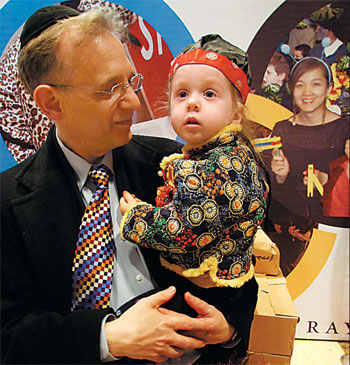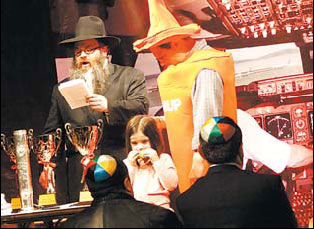How to keep it kosher
Last week, Jews around the world celebrated Purim, one of the most important holidays on the Jewish calendar. At this time, Jews recall their escape from an evil plan hatched by a Persian minister to annihilate them. They wear costumes, drink copiously, put on plays, give gifts to each other and donations to the poor.
And the Jewish residents of Beijing were no exception. Not only were they able to observe their religious customs, they had a choice of celebrations to attend.
|
Akiva Pearlman holding his son Raphael, dressed in Chinese costume for the holiday in Beijing. |
There was a party on Thursday night sponsored by the Chabad Lubavitch community (an orthodox organization); on Friday night, sponsored by the Kehillat Beijing congregation. And on Saturday night, the Israeli embassy also had a gathering.
The fact that Jews in Beijing had more than one choice of Purim parties to attend highlights the options Jews have to observe their religion when they come to China.
Jewish prayer usually requires a group of at least 10 people. This is one of the main reasons why Jews need a community.
Most people assume that in corners of the world where Jews are not typically found, the Chabad movement will be the first outpost of Jewish life. Chabad is a Lubavitch Hasidic strand of Judaism and centers over the world support observing orthodox Jewish customs.
In China, Chabad has seven centers, in and around Hong Kong, Shanghai, Beijing and Guangzhou.
New Yorkers Liora and Akiva Pearlman have lived in Beijing for two years and were in Shanghai two years before that. They say life for a Jew is much harder in China than New York, but Chabad makes it easier. They are orthodox Jews, so in China, "Our only choice is Chabad," Liora says.
Yet in Beijing and Hong Kong, where there are multiple communities, there are choices for those who are not comfortable with orthodox services like Chabad.
Jews have various prayer customs. In Beijing, Kehillat Beijing has been around for two decades, much longer than Chabad, which came in 2001. The Kehillat Beijing differs from Chabad in many ways. For example, at Kehillat men and women pray together in mixed seating; while Chabad puts a divider between the genders.
American Jeff Bernstein lives in Shanghai where the only choice for Shabbat services is Chabad.
"I was not used to its style, with the wall down the middle. I felt foreign," he says. But when he goes to the liberal Kehillat Beijing, "I feel a community."
Some Jewish people find themselves going to Jewish services even though they may not attend back home. Being with other Jews and by performing these rituals they find familiarity in a foreign place.
Leo Lazar is in Beijing for six months working for General Electric. He says going to religious services in China was more appealing to him than in other places he has lived, like France or the United States. "Maybe it's the sense of community the sense of an adventurous - as opposed to a painstaking - diaspora."
Besides prayer and holidays, another way that Jews observe their faith is by keeping kosher. Kosher literally means "fit for ritual use". Most commonly, kosher refers to the dietary laws for Jews laid out in the Old Testament, interpreted and codified by the rabbis. The rules not only specify which animals and animal products a Jew can eat, but they explain in what combinations these items may be eaten and how to slaughter and prepare them.
Some Jews in China have no choice but to eat food prepared in their homes and buy imported foods with kosher certification. In Beijing, Shanghai and Hong Kong, however, there are kosher restaurants. Last year saw the opening of Dini's, Beijing's first kosher restaurant.
But if someone travels outside of these cities for business, there are no options for kosher dining. "I travel throughout China and I always have to take food with me," says Akiva Pearlman. At his office in Beijing he often orders out from Dini's for lunch.
Many Chinese food exports are certified as kosher after an inspection by a rabbi to verify that the products follow religious laws. In fact, half of China's $2.5 billion a year in food ingredient exports to the US are kosher.
|
Chabad Rabbi Shimon Freudlich (first from left) says the prayer in front of a costumed crowd. Photos by Alison Klayman |
The ironic thing is the rabbis who travel to remote Chinese factories to certify them as kosher will often have a hard time finding something to eat. Rabbi David Moskowitz of Shatz Kosher services, a kosher certification company with offices in Shenzhen of Guangdong province and Qingdao of Shandong province, says he often eats "lots of fruits and vegetables" when he is on the road in China.
In order to continue the Jewish way of life, it is important for a community to provide Jewish education for their youth. Again, in major cities in China, it is possible to find options for Jewish foreigners to enroll their kids in a school. In Hong Kong's Shuva Israel there is even a "kolel", a place for adult study of religious texts.
"You can't have a community if you don't have a school," says Elissa Cohen, head of the Kehillat Beijing Sunday school.
In Beijing, there is also a Chabad day school for nursery and elementary ages. French Jew Gilles Perez works for Peugeot. He only agreed to bring his family to Beijing when he discovered his son could still attend Jewish day school.
Although there may be an impression that Jews in China are just beginning to build a community, many places in China have an historic Jewish presence. Jews came from Persia as early as the 8th century via the Silk Road, and a community in Kaifeng, Henan province, was established in 1163 by the Chinese emperor.
More Jews from areas in the Middle East came to trade in China in the late 19th century, and some like the Sassoon family established successful businesses. New communities of Russian Jews were also founded in Shanghai, Harbin and Tianjin. By 1903 Shanghai had three synagogues, with a population of around 10,000. Another 20,000 came from Europe during World War II seeking refuge from the Nazi regime.
While Jews can find community and history in China, many have also found acceptance from Chinese people as well. Lazar in Beijing says: "It's refreshing to be in a place where anti-Semitism has no historical roots."
(China Daily 03/28/2008 page19)
















